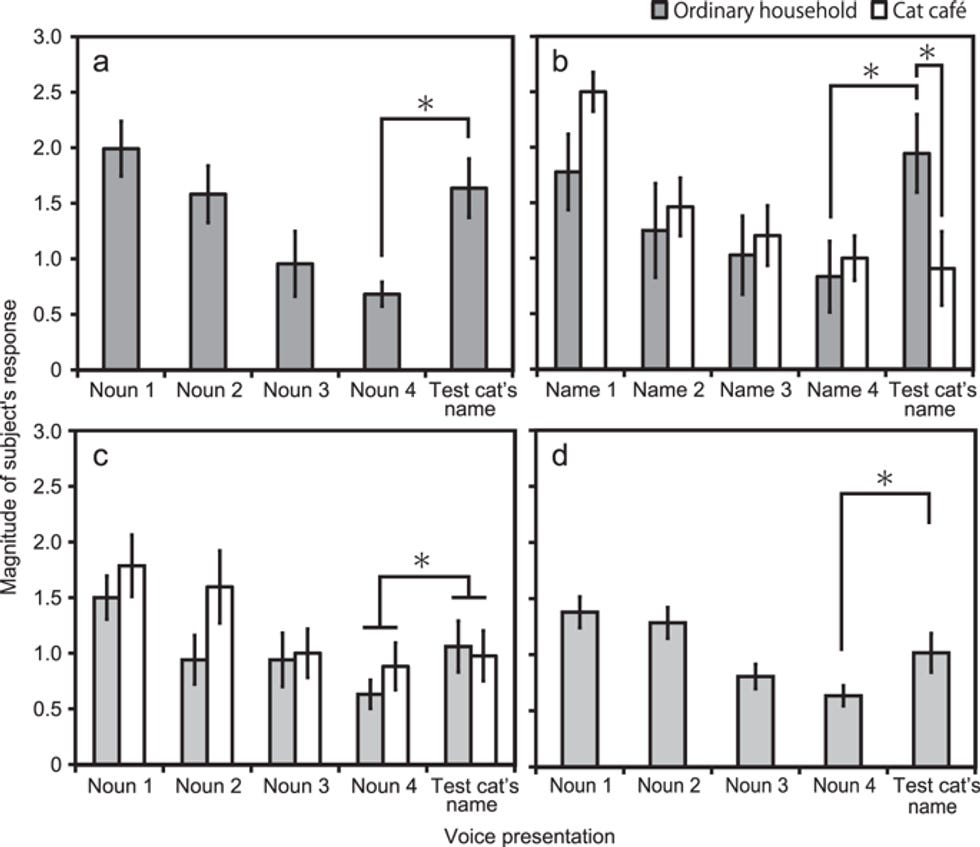And This Is How Planet Of The Cats Begins
(This is not about Australia.)
Well, we've fucked up the planet enough and if some species has to take over, and it's not capybaras or dachshunds, then I guess cats are better than cockroaches. And now we have proof that the these purring pendejos have known what the hell's been going on all along. Well, maybe not proof that they get the jokes on "A Closer Look" and just choose to not laugh with us, but evidence that they know their fucking names and choose to not come when we call them. Where is this proof, Carlos? Glad you asked, gentle reader. In none other than Nature, one of the top science journals. Published a couple of weeks ago, I'll give you a summary of the experiment and findings. But first, some backstory!
It seems that scientists have mostly focused on dogs over cats when doing research into how our pets communicate with us. This is probably because dogs are awesome, and everyone loves dogs and cats are satanic vessels for the coming of the anti-Christ … or so I'm told. Don't start the hate-messaging like you all did when I dissed on baseball. This is just what my cat sources are telling me.
Anywho, researchers have shown that cats can see us point to hidden food and get our message, just like dogs can. In another study , the scientists found that unlike dogs, cats don't look at us when they can't find food but will take cues from our facial expressions if we seem scared about something in the room. In other studies, Lovecraftian familiars, I mean cats, were shown to have their behavior influenced by human facial and vocal cues as well as gestures.
Now, unlike felines, where scientists really haven't looked that much, a bunch of research studies have shown that domestic dogs can communicate with us. I think we all knew that so this is a little bit of "no duh" kind of science, but still nice to know that yeah, Captain Mustard really does feel me, brah. Here's a few links to THOSE studies. Link uno . Link dos . Link tres .
So, I don't know if we are on the verge of the golden age of cat communication research, but here is the first big thing in that. Four Japanese researchers from Musashino University in Tokyo conducted four different but similar experiments. In Experiment 1, they tested if cats can discriminate their own names from general nouns that sound similar. In Experiment 2, they tried to see if cats could tell their names from the names of other cats they lived with. Experiment 3 was a variation of Experiment 1 but this time looking at cats that lived with other cats. They also included cats that lived in a "cat café," or a business where people can go and hang out with a bunch of cats. Ah, Japan you wonderful, crazy place. In the first three experiments the scientists used the cats' owners' voices (not exactly sure how that worked in the "cat café") but in Experiment 4 they let strangers say the names and non-name nouns.
Here comes the science!

Saito et al

Saito et al
As you can see, the actual results are a bit more "oh really?" than "EUREKA!" to this Mexican biochemist, but please retort if any behavioral psych types are reading this. The measure of understanding the name versus the non-name noun was either ear, head or tail movement or some cat vocalization and then combining the scores. Um, I guess. The only experiment where I really see their conclusion and that's only for differentiating from "noun 4" is the first one. Regardless, here is THEIR conclusion:
In Experiments 1, 3, and 4, cats that habituated to general nouns with the same length and accent as their own names dishabituated to their own names. This was true both when their owner's voice was presented (Experiments 1 and 3) and when the unfamiliar person's voice was presented (Experiment 4), in spite of the fact that cats distinguish owners' voices from unfamiliar persons' voices. These results show that cats can identify their own names from other words that consisted of the same number of mora but with different phonemes when they are uttered both by familiar person and by unfamiliar person. The results of Experiment 2 suggest that cats from ordinary households discriminate their own names from those of cohabiting cats but that cats from a cat café may not. From the results of all experiments, it thus appears that at least cats living in ordinary households can distinguish their own names from general words and names of other cats. This is the first experimental evidence showing cats' ability to understand human verbal utterances.
Man, I think you're really stretching the what the data says here, and yet, Nature published the findings. Are you guys convinced? Hijole, I don't know. I'm really not. I AM convinced that I need to go back and visit Japan and find one of these "cat cafes." Maybe this is the world's weirdest travel ad and not really an experiment on cat/human communication. YOU be the judge. Here's the whole crazy paper for your perusal.
Wonkette is ad-free and funded ENTIRELY by you. Throw us a buck or twenty if you can!



Let me get this straight, cats could understand me this whole time, they just didn't care? My stars! Looking forward to future scientific studies on wetness of water, fire bad, etc.
Linguists and computer scientists spent decades in their efforts to decode cat language. After all their hard work, and to the disappointment (but not surprise) of cat lovers everywhere, all the cats' utterances, meows, shrieks, whining, hissing, and yodeling, etc. boiled down to just two sentences:
1. When's dinner?
2. Everything here is mine. https://media2.giphy.com/me...